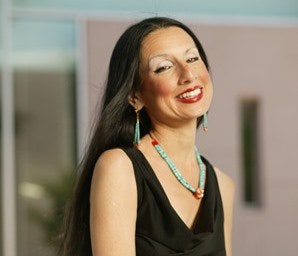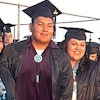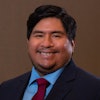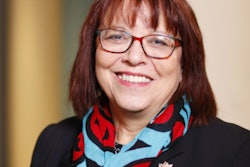As a youngster coming of age in Los Angeles in the 1970s, Rebecca Tsosie became radicalized to the plight of the American Indian community when she learned of an international incident that transpired on February 27, 1973 in Wounded Knee, S.D., on the Pine Ridge Indian Reservation
 Motivated by the Wounded Knee incident, Rebecca Tsosie embarked on a path to becoming one of the nation’s most visible scholars in Indian law.
Motivated by the Wounded Knee incident, Rebecca Tsosie embarked on a path to becoming one of the nation’s most visible scholars in Indian law.Nearly 200 followers of the American Indian Movement (AIM) had attracted national attention when they seized control of the town of Wounded Knee for 71 days in an effort to impeach tribal president Richard Wilson, whom they had accused of widespread corruption. The organization had also called on the U.S. government to reopen treaty negotiations, and they sharply criticized U.S. leaders for failing to fulfill its treaties with the Native people.
In the midst of the protests, armed FBI and U.S. Marshals were summoned to the scene, and a shootout transpired. Several people were killed.
When Tsosie, who is of Yaqui descent, learned of the incident years later from members of the AIM, she was not only intrigued, but she was inspired.
“I had never been to South Dakota, and this was not something I’d learned about in school,” says Tsosie, who is now a regents’ professor at the Sandra Day O’Connor College of Law at Arizona State University. “But I was listening to their stories, and it was very powerful. I wanted to read more. I was really caught up in it, and I wanted to do all my school papers on it.”
Not only did the Wounded Knee incident spark Tsosie’s interest, but it set her on the path to becoming one of the nation’s most visible scholars in Indian law.
After she arrived at ASU in 1994, she began directing the school’s Indian Legal Program, which provides legal education and promotes scholarship in Indian Law while also providing legal services to tribal governments.
According to Tsosie, who stepped down as director in 2011, the program not only trains students to effectively represent Native people, but it also educates them on the differences between the legal systems of Indian Nations and those of the state and federal governments.
Over the years, Tsosie noticed a growing interest in Indian law by her students.
“I think it gives you a passion for getting the truth out,” says Tsosie, who attended the University of California Los Angeles as an undergraduate and went on to enroll at the university’s law school. “So much is not known about the Native community — treaty rights, gaming activity. I have a commitment to doing this work.”
While in law school, she began studying cases specific to American Indian communities.
“I was really angry by the old cases that we studied,” Tsosie says in an interview with Diverse. “It was clear to me that so many people did not know about sovereignty issues.”
Shaping minds
After she graduated from UCLA’s law school, Tsosie clerked for an Arizona Supreme Court justice, became a litigator and then vowed to bring her skills and knowledge of the law to ASU, where she has been busy training a new generation of legal scholars.
Douglas J. Sylvester, dean of ASU’s law school, says Tsosie’s scholarship is cutting-edge.
“Rebecca takes her role as mentor and teacher very seriously,” says Sylvester, “never turning away a student who may be homesick or struggling with a concept or a course.
“She was instrumental in transforming our Indian Legal Program into one of the nation’s best, and she helped create our excellent Master of Laws degree in tribal law, policy and government, as well as our award-winning Indian Legal Clinic,” adds Sylvester, who was named dean of the law school in March 2012. “And she’s done all this while continuing to be one of the world’s foremost scholars on Indian law and numerous other disciplines.”
Lauded as one of the world’s most prolific and highly regarded scholars of Indian law, Tsosie has authored more than 40 law review articles and book chapters. Her work is widely cited, and she has contributed chapters to almost every leading volume on American Indian law published since 2001.
But despite international recognition, those at ASU say that Tsosie’s first commitment is always to her students.
“Rebecca made every student on the first day feel that they weren’t in the wrong place, that they had a purpose for being there, that they were knowledgeable enough to be there,” says Naomi White, a prosecutor for the Gila River Indian Community and a 2010 graduate of the law school. “Although the students were awestruck by her, she made us feel as if she was the one who was privileged to be able to teach us.”
Raised in Window Rock, Ariz., on the Navajo Reservation, White first met Tsosie in 2006 at the Pre-Law Summer Institute at the American Indian Law Center in Albuquerque, N.M. White already knew she wanted to go to law school, but meeting Tsosie convinced her that ASU was the place for her.
“She made a point of helping students feel like a family, being a community, being there for each other, rather than being competitive with each other,” says White. “She wanted the students to excel but remain friendly, to work together toward a uniform goal and to serve our communities. She wanted us to be exceptional Indian law practitioners, and she created an environment for us to thrive in.”
Making a difference
When she is not in the classroom, Tsosie serves as an associate justice on the Fort McDowell Yavapai Nation Supreme Court and as a judge on the San Carlos Apache Court of Appeals. In addition to teaching courses in constitutional law, critical race theory and federal Indian law and property, she is also a faculty fellow in the College of Law’s Center for Law and Global Affairs and an affiliate professor in the ASU American Indian Studies Program.
“Under her direction, the law school began taking this evolutionary approach to federal Indian law issues and developing their relationship with and relevancy to tribal governments,” says Diane J. Humetewa, the former U.S. Attorney for the District of Arizona and ASU’s Special Advisor to the President for American Indian Affairs. “Rebecca was a trailblazer to begin looking at these issues from a legal perspective, a theoretical perspective, a human rights perspective. There are generally a handful of people whom I have called [on] in various stages of my career, and she was one. She has a way of looking at a situation that is different coming from the role of a Native person — the role of a female and the role of lawyer. She knows the academic side of the law, and she knows the national and international law of the land on these issues.”
Humetewa was recently nominated by President Obama to serve as a judge on the U.S. federal court. If confirmed by the U.S. Senate, she will become the only active member of an American Indian tribe to serve in the federal judiciary and the first female American Indian to do so.
Tsosie says that she enjoys life in the academy and has been fortunate to engage in work that drives her passion.
“I love working with students,” she says. “We’ve been able to train many students over the years, and I’m very proud of that. I’m also happy to see that Indian law is an area that is getting increasingly more attention.”
Jamal Watson can be reached at [email protected].





















